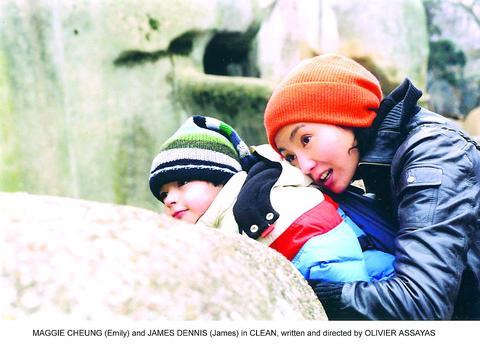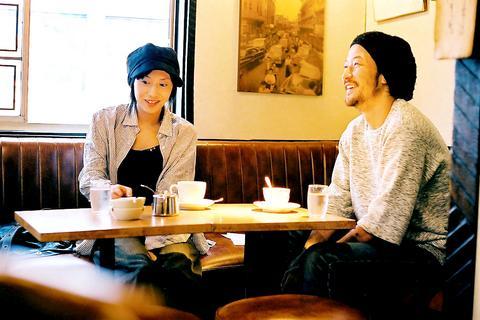It is a busy time for star-spotting. Renee Zellweger came to Taipei yesterday to promote Bridget Jones: The Edge of Reason and will stay two more days. French director Olivier Assayas will attend Clean, this weekend's closing film of The Taipei Golden Horse Film Festival. Andy Lau and Zhang Ziyi will be at the annual Golden Horse Awards in Taichung and Nicholas Cage will soon come over to promote National Treasure in Taipei.
This is a weekend to enjoy movies. The long-awaited Hou Hsiao-hsien (

PHOTOS COURTESY OF GOLDEN HORSE EXECUTIVE COMMITTEE
Cafe Lumiere is a must-see. Some critics have called it Hou Hsiao-hsien's best work since A City of Sadness (

PHOTOS COURTESY OF GOLDEN HORSE EXECUTIVE COMMITTEE
In Cafe Lumiere, Yo Hitoto plays Yoko, a young Japanese single mother and freelance writer returning home from Taiwan. Yoko researches Taiwanese musician Chiang Wen-yeh (
Tadanobu Asano plays Hajime, the young owner of an antique bookstore. He expresses his affection for Yoko by taking walks with her, spending time in old-fashioned cafes with her and looking at her research. Hou's entrancing images reveal a story about personal feelings and generation gaps in Yoko's own calm pace.
There are some stunning scenes of Tokyo trains and these shots demonstrate Hou's association of nostalgia with riding trains. Cafe Lumiere pays tribute to Ozu Yasujiro and his classic 1920 film Tokyo Story.
Clean is also worth watching. Maggie Cheung plays Emily, a woman sent to jail for drugs use. Emily deals with her rock star husband dying from a drug overdose and her little son refusing to accept a drug-addicted mom.
The six-months jail sentence changes Emily. She goes to Paris, works as a waitress and tries to stay clean so that she has a chance to win back custody of her son. In the meantime she sings in a pub to fulfill her dream of becoming a chanteuse. Her efforts to stay drug free, however, are not always rewarded.

June 9 to June 15 A photo of two men riding trendy high-wheel Penny-Farthing bicycles past a Qing Dynasty gate aptly captures the essence of Taipei in 1897 — a newly colonized city on the cusp of great change. The Japanese began making significant modifications to the cityscape in 1899, tearing down Qing-era structures, widening boulevards and installing Western-style infrastructure and buildings. The photographer, Minosuke Imamura, only spent a year in Taiwan as a cartographer for the governor-general’s office, but he left behind a treasure trove of 130 images showing life at the onset of Japanese rule, spanning July 1897 to

One of the most important gripes that Taiwanese have about the Democratic Progressive Party (DPP) is that it has failed to deliver concretely on higher wages, housing prices and other bread-and-butter issues. The parallel complaint is that the DPP cares only about glamor issues, such as removing markers of Chinese Nationalist Party (KMT) colonialism by renaming them, or what the KMT codes as “de-Sinification.” Once again, as a critical election looms, the DPP is presenting evidence for that charge. The KMT was quick to jump on the recent proposal of the Ministry of the Interior (MOI) to rename roads that symbolize

On the evening of June 1, Control Yuan Secretary-General Lee Chun-yi (李俊俋) apologized and resigned in disgrace. His crime was instructing his driver to use a Control Yuan vehicle to transport his dog to a pet grooming salon. The Control Yuan is the government branch that investigates, audits and impeaches government officials for, among other things, misuse of government funds, so his misuse of a government vehicle was highly inappropriate. If this story were told to anyone living in the golden era of swaggering gangsters, flashy nouveau riche businessmen, and corrupt “black gold” politics of the 1980s and 1990s, they would have laughed.

In an interview posted online by United Daily News (UDN) on May 26, current Chinese Nationalist Party (KMT) Chairman Eric Chu (朱立倫) was asked about Taichung Mayor Lu Shiow-yen (盧秀燕) replacing him as party chair. Though not yet officially running, by the customs of Taiwan politics, Lu has been signalling she is both running for party chair and to be the party’s 2028 presidential candidate. She told an international media outlet that she was considering a run. She also gave a speech in Keelung on national priorities and foreign affairs. For details, see the May 23 edition of this column,